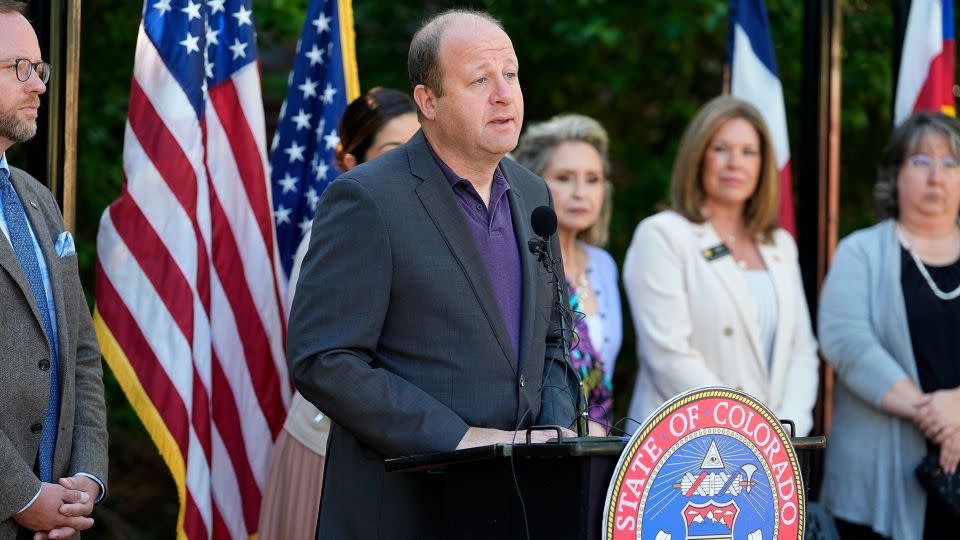Colorado legislature sends bill to regulate kids’ social media use to governor’s desk

The Colorado Legislature sent a bill to the governor this week that seeks to limit children’s social media use by requiring, among other actions, a pop-up notification that informs young users of when they use a social media platform for an extended period of time.
The bill is the latest state effort to regulate social media use amid widening fears that heavy usage is harmful for children. Democratic Gov. Jared Polis, who has previously voiced concerns over state regulation of social media, has not yet indicated whether he will sign the bill, and a spokeswoman said he was reviewing the final version sent to him on Tuesday. The bill passed the Democratic-controlled legislature in April by comfortable margins.
If the bill is signed into law, it would require social media platforms to display a notification to users who are under 18 who have spent an hour on the platform over a 24-hour period, or are active between the hours of 10 p.m. and 6 a.m. The notification would include “information about their engagement in social media that helps the user understand the impact of social media on the developing brain, and the mental and physical health of youth users.” It would repeat at least every 30 minutes after the initial notification.
The bill would require the notifications to be in effect starting on January 1, 2026.
Democratic state Sen. Lisa Cutter, one of the bill’s sponsors, said the pop-up notifications would be covered under the state’s Consumer Protection Act, and if a company doesn’t comply, the attorney general’s office could slap it with a “huge penalty” of $20,000 per violation.
The bill also calls for the creation and maintenance of “a resource bank of existing evidence-based, research-based scholarly articles and promising program materials and curricula pertaining to the mental and physical health impacts of social media use by youth, internet safety, and cybersecurity.”
The “resource bank” would be created by a group of people knowledgeable about the intersection of youth and social media, including kids, parents and educators. The materials would be publicly available beginning on July 1, 2025.
Polis has previously voiced concerns about state regulation of social media, telling NBC News’ “Meet the Press” in December that he thinks “the responsibility belongs to the parents, not the government.”
Democratic state Rep. Judy Amabile, one of the bill’s sponsors, said in March that the bill would give parents and teens resources to make informed decisions about excessive social media usage and the “dreaded ‘doom scroll.’”
“We’re working to encourage healthier social media habits among our youth by giving them the tools they need to make smart decisions about their own social media usage and prompting our kids to take a break from their phones,” Amabile said.
Healthier Colorado, a nonprofit public health organization, conducted research on social media and its impact on youth mental health, which led the group to support the legislation.
“The apps, by design, are very addictive,” Kyle Piccola, Healthier Colorado’s senior director of communications, said. “And so, we knew that we wanted to get involved somehow, pass something to at least start the conversation on how can we turn this ship around, because we know that teens are suffering from the overuse and the problematic use of social media.”
But TechNet, a technology advocacy group that opposes efforts to regulate social media companies, said that although children deserve a heightened level of protection online, it would rather have families, instead of the government, regulate social media usage.
TechNet will “continue to work with the General Assembly to ensure that future legislation upholds the First Amendment, does not conflict with any other relevant federal law, and avoids burdening lawful speech,” said Ruthie Barko, TechNet’s executive director for Colorado and the Central US.
Several other states have proceeded with efforts to regulate kids’ social media use. In March, Florida moved to restrict social media access by banning those under the age of 14 from having their own social media accounts and requiring age verification for those who visit sexually explicit websites. States, including Arkansas, California, Louisiana, Ohio and Utah, have also pushed similar bills to regulate tech platforms.
Legal challenges have been filed in response to some of those efforts. In February, a federal judge temporarily blocked Ohio’s law, which seeks to regulate kids’ access to social media platforms, over concerns about its breadth and the likelihood that it could infringe on teens’ First Amendment rights to access information online. And last year, another federal judge temporarily blocked Arkansas’ law.
For more CNN news and newsletters create an account at CNN.com


